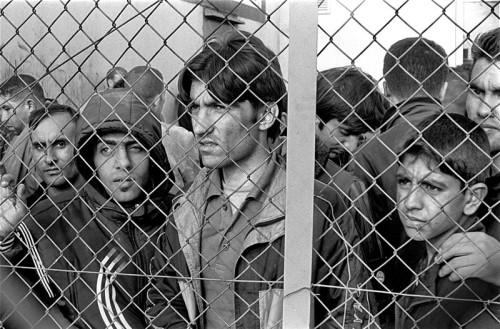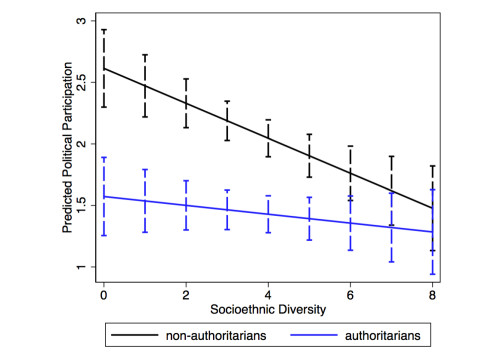The success of populist radical right parties is not a result of heightened participation in politics by authoritarians
Across Europe, the populist right is surging, with UKIP in the UK, Jobbik in Hungary, and the Sweden Democrats amongst others making political weather across the continent. Shane P. Singh and Kris Dunn that their success has not been fuelled by an increase in participation by people or groups with authoritarian tendencies, but instead ‘but instead arises from a convergence in participation levels among non-authoritarians and authoritarians in settings of diversity’.
Immigration is making headline news perhaps more than ever. Europe struggles to deal with the inflow of hundreds of thousands of refugees from the Middle East and Northern Africa, who are nearly always of a different race, ethnicity, or religion than the majority of people in the countries in which they hope to settle. Meanwhile, in the United States campaign rhetoric in the run-up to next year’s presidential election has frequently centred on immigrants from Mexico and Central America, who now account for over a quarter of the population in several states.
Such upward trends in socioethnic diversity of course have a wide range of social, economic, and political effects. In an article we recently published in the European Journal of Political Research, we focus on how such diversity shapes political participation. An earlier body of literature links diversity to lower participation levels. There are at least two reasons for this link. First, heterogeneous communities have lower levels of intergroup social interaction. This, in turn, decreases social capital and the participatory behaviours that tend to associate with it. Second, the presence of “others” induces a sense of threat arising from putative competition over economic resources and/or cultural norms—and such feelings of threat also correspond with less participation in politics.
Building on this literature, and focusing on threat in particular, we argue that the relationship between socioethnic diversity and political participation is not as straightforward as the literature currently suggests. Rather than this relationship being one-size-fits-all, we propose that the link between diversity and political participation depends on individuals’ authoritarian predispositions. People with an authoritarian predisposition tend to have higher than average levels of anxiety, to have lower than average cognitive ability, and to hold prejudiced and intolerant attitudes. Such individuals also tend to participate in politics at a relatively low rate.
In high-diversity settings, it seems intuitive that these authoritarians will see an incentive to get politically involved in an effort to bring policy in line with their preferences—to reduce diversity. We challenge this intuition, arguing that authoritarians, who live in a constant state of threat and anxiety, are largely unaffected by the threat that accompanies socioethnic diversity. In our view, socioethnic diversity is unlikely to increase perceived threat among authoritarians, as their proverbial hackles are already raised. Essentially, socioethnic diversity will not alarm authoritarians because they are already alarmed. Conversely, among non-authoritarians, who are susceptible to new threats, higher levels of socioethnic heterogeneity should correspond with increased anxiety and therefore lower levels of political participation. Taken together, the static levels of participation among authoritarians and the reduced levels of participation among non-authoritarians should result in a convergence in participation levels across authoritarians and non-authoritarians where society is very diverse.
To test our expectations, we gather data on political participation, authoritarian predisposition, and socioethnic diversity from over 50 countries and over 100,000 individuals. To capture political participation, we create an index that takes into account signing a petition, joining in boycotts, attending peaceful demonstrations, and membership in political parties. (Our findings are similar when we use a scale that also considers voter turnout.) We measure authoritarianism using questions that inquire about individuals’ childrearing values, which unobtrusively capture this predisposition.
An example of our findings is provided in the figure. Here, socioethnic diversity is measured across countries using a popular scale from Alesina and co-authors. Among authoritarians, there is essentially no relationship between socioethnic diversity and political participation. Conversely, there is a strong and negative relationship between diversity and participation among non-authoritarians. As a result, in countries with high levels of socioethnic diversity, predicted levels of participation among authoritarians and non-authoritarians are about the same.
The patterns we uncover help to explain the recent electoral successes of populist radical right parties in Europe and to dispel a commonly held assumption about the electoral reasons for this success. The ideas and policy positions of populist radical right parties,
which include nativism, stricter immigration policies, nationalism, and belief in a strictly ordered society, are attractive to those with authoritarian personality traits. Thus, with the surge of immigration into European countries mentioned at the outset, it seems reasonable to assume that populist radical right parties’ improved election returns stem from an authoritarian backlash against rising socioethnic diversity.
However, our examination of political participation rates among authoritarians and non-authoritarians suggests that such an assumption is incorrect. Our findings instead suggest that the success of populist radical right parties is not a result of heightened authoritarian participation, but instead arises from a convergence in participation levels among non-authoritarians and authoritarians in settings of diversity. When non-authoritarians participate less and authoritarians continue to participate at the same rate, the politically active portion of the population, on balance, becomes more authoritarian. Given the more intolerant and punitive policy preferences of authoritarians, this closing gap in participation levels can have a considerable impact on election results and, in turn, the policy preferences of elected representatives.
—
This post represents the views of the author and not those of Democratic Audit UK or the LSE. Please read our comments policy before posting.
—
Shane P. Singh is an associate professor in the School of Public and International Affairs at the University of Georgia. His website is here.
Kris Dunn is a lecturer in comparative politics in the School of Politics and International Studies at the University of Leeds. His website is here.







 Democratic Audit's core funding is provided by the Joseph Rowntree Charitable Trust. Additional funding is provided by the London School of Economics.
Democratic Audit's core funding is provided by the Joseph Rowntree Charitable Trust. Additional funding is provided by the London School of Economics.
Exciting piece based on EJPR article: https://t.co/lGSJRtZksH
Success of radical right parties not a result of heightened participation by authoritarians https://t.co/zhVDX5yAyF https://t.co/s3DXPqoscy
Success of populist radical right parties is not a result of heightened participation in politics by authoritarians https://t.co/JyBTQDfcmt
Dr Kris Dunn’s latest article looks at the rise of populist radical right parties in Europe. Available here: https://t.co/LoXd2sjJ9o…
The success of populist radical right parties is’nt due to more participation in politics by authoritarian voters https://t.co/MOIwgyD0XK
The success of populist radical right parties is not a result of heightened authoritarian participation in politics https://t.co/JBhJI9Nzj0
The success of populist radical right parties is not a result of greater participation in politics by authoritarians https://t.co/nilBm0W95a
Success of populist radical right parties is not a result of heightened participation in politics by authoritarians https://t.co/NtgmquAS4a
Success of populist radical right parties is not a result of heightened participation in politics by authoritarians https://t.co/3WOXvQOBBt
Seen elsewhere: The success of populist radical right parties is not a result of heightened participation… https://t.co/7s1tEfTYBf #YesPlus
Interesting: The success of populist radical right parties is not a result of heightened… https://t.co/jJ7j3zSYor https://t.co/KZDUZsiTwR
Populist radical right parties are succeeding more because ethnic diversity cuts voting by non-authoritarian people. https://t.co/MOIwgyD0XK
Success of populist radical parties in UK, Hungary & Sweden is not result of greater participation by authoritarians https://t.co/VOhqUa3Guh
The success of populist radical right parties is not a result of heightened participation in politics by authorita… https://t.co/dEI4RVbtDr